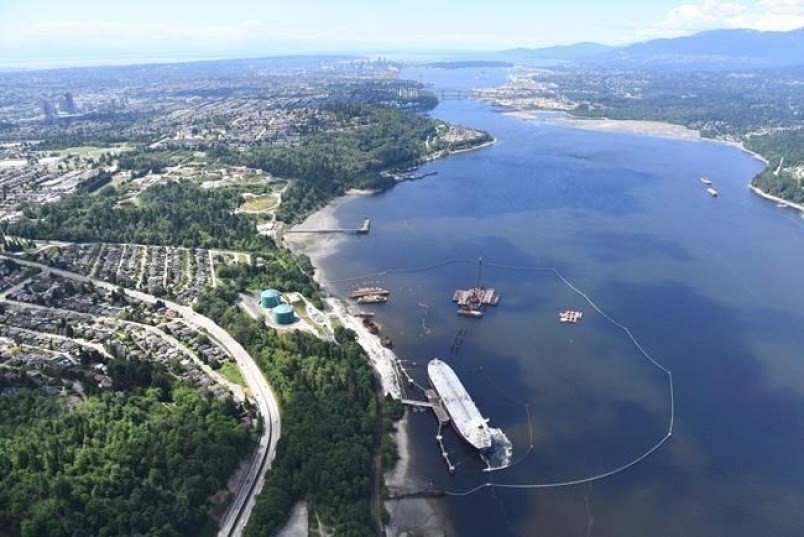The Trans Mountain Pipeline expansion project is back on for potential cabinet approval following reconsideration by the National Energy Board. Local First Nations, however, say their opposition remains steadfast.
The NEB released its reconsideration report recommending the federal government approve project Friday. The original approval was quashed in the Federal Court of Appeal last August over inadequate consultation with First Nations, including the Squamish and Tsleil-Waututh, who launched legal challenges of the NEB’s approval.
Specifically, the process failed to take into account the impacts of marine shipping on the southern resident killer whale population, which have cultural significance to the Squamish and Tsleil-Waututh, the court found.
In September, the federal cabinet ordered a 22-week review period to address the marine impacts raised in the court’s ruling before releasing a final report and recommendations no later than Feb. 22.
Following that review, which included more testimony from First Nations, the board acknowledged the project is likely to have “significant adverse environmental impacts” on the killer whales and the First Nations’ cultural use associated with them, that the greenhouse gas emissions from tankers would be significant, and that, while a worst-case scenario spill was unlikely, it would have significant environmental impacts.
“While these effects weighed heavily in the NEB’s reconsideration of project-related marine shipping, the NEB recommends that the government of Canada find that they can be justified in the circumstances in light of the considerable benefits of the project and measures to mitigate the effects,” said Robert Steedman, chief environmental officer for the NEB.
Those benefits, the board concluded, are increased access to diverse markets for Canadian oil, jobs created across Canada, development opportunities for business, communities and First Nations, direct spending on pipeline materials in Canada and considerable revenues to various levels of government.
The board’s recommendation includes the original 156 conditions related to safe construction and operation of the pipeline, plus 16 new recommendations addressing the marine shipping concerns that fall outside the NEB’s mandate but that it is asking the federal government to enforce.
Among those recommendations: That the government implement a regional cumulative effects management plan for the Salish Sea, including targets to reduce underwater noise, strike/collision risk of vessels with marine species and key contaminant levels over time, create a marine bird monitoring and protection program, conduct a feasibility study for establishing a Southern Strait of Georgia National Marine Conservation Area Reserve, develop an offset program that addresses increased underwater noise and the increased strike risk posed for species at risk, and review and update federal marine shipping oil spill response requirements. All of those should be done in consultation with First Nations, the report recommends.
“The panel feels strongly that if these recommendations are implemented, they will offset the relatively minor effects of the project-related marine traffic and in fact will benefit the entire Salish Sea ecosystem,” Steedman said.
In a statement, Tsleil-Naututh Nation Chief Maureen Thomas said the NEB decision was “disappointing, but not at all surprising.”
“This recommendation changes nothing about our opposition to the project. We continue to deny our free, prior and informed consent,” she said in a release.
The NEB’s reconsideration only considered marine impacts up to 12 nautical miles from the terminal and tankers, which excludes critical orca habitat, Thomas noted, and the rushed, 22-week timeframe wasn’t nearly long enough for the NEB’s consideration of the evidence to be meaningful.
“The NEB, unfortunately, repeated the same errors that previously landed them in court,” she said. “It felt like another rigged process with a pre-determined outcome from the start.”
The recommendations and conditions the NEB has put on the pipeline’s approval still do not address Tsleil-Waututh’s concerns raised in their own environmental assessment for the project.
“Our expert evidence confirmed what we found in our independent review from 2016: that oil spills are inevitable, cannot be cleaned up effectively, and will have catastrophic effect on the environment, and (Tsleil-Waututh) rights.”
The Squamish Nation responded to the NEB report shortly after it was released saying the nation will continue to oppose the pipeline expansion because of its environmental risk, its incursion into Squamish Nation jurisdiction and because of its climate impacts.
“Our nation expects our territory and inlet to have the highest protections for our culture, local jobs, and residents. The Trudeau government has been ignoring the scientific evidence (on) the marine impacts on orcas and refusing to do a climate review of this project. We are in a climate emergency and we need to recognize the scale and scope of the emergency and respond accordingly,” said Khelsilem, Squamish Nation spokesman in a press statement.
Stewart Phillip, Grand Chief of the Union of BC Indian Chiefs, said he the second round of consultations ordered by the federal government was “fundamentally and horribly flawed.” And he reiterated that he believed the pipeline doesn’t have the support of British Columbians.
“Without question there will be further lawsuits as we move forward in regard to the blatant conflict issues and there will be more demonstrations, marches and rallies. The gauntlet has been thrown down by the Trudeau government and the NEB and the fossil fuel industry. The choice will be the continuation of the orcas on the West Coast of British Columbian or the Trans Mountain Pipeline,” he said. “This pipeline, as I have said on many, many occasions, will never see the light of day.”




